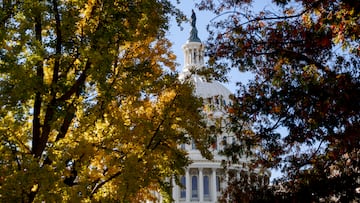POLITICS
What consequences would the government shutdown have?
Congress is heading towards a government shutdown unless the Republican-controlled chamber can come to an agreement this week.

Since 1980, the US federal government has shut down ten times, with the longest taking place over the course of thirty-five days between December 2018 and January 2019.
The 2018-2019 shutdown occurred after Republicans, led by President Trump, withheld their votes on a spending bill to gain funding for the border wall. Democrats who came to hold a majority in the House in early January 2019 did not budge, and in the end, Republicans surrendered. All government shutdowns over the last three decades have occurred when Republicans controlled the House of Representatives.
Congress has until 19 November to pass a bill to continue funding the government and a bill is set to be introduced this week.
Consequences of a shutdown
Shutdowns, especially for a government as large as the US, are logistically difficult and costly.
The Congressional Budget Office estimated the most recent shutdown, which lasted five weeks, decreased economic output by an estimated $11 billion.
About $3 billion had to be spent to pay back furloughed federal workers. The IRS reported an additional $2 billion in losses, which could not carry out tax compliance activities to reduce evasion. The remainder represents economic losses through the secondary effects of the shutdown: slower businesses as furloughed workers stay home, a decrease in public transit systems around Washington DC, and delays in production as businesses evaluate impacts on their own supply chains. A smaller amount in losses was also reported by other agencies for fees, including those associated with the closure of national parks and other services.
Credit rating agencies, such as Moody’s, Standard & Poor’s, and Fitch, closely monitor the fiscal health and stability of governments. Risks of shutdown have led these agencies to reconsider their assessments of the US government’s creditworthiness; a downgrade in the credit rating would result in higher borrowing costs for the government and weaken investor support in the US economy.
Credit ratings have been sunk by shutdowns before; 5 August 2011. It was the first time the rating had fallen below AAA. Moody’s is the last credit agency remaining to allocate such a score the the US government.Furloughed workers
In the 2018-2019 shutdown, more than 380,000 workers were furloughed, meaning they were sent home and not required to work. An additional 420,000 workers were required to work but were not paid until after the spending showdown ended. Federal workers were compensated after the crisis ended. However, many federal contractors hired by a third party and paid by the government were not paid for the hours lost during the shutdown.
The fact that federal contractors, many of whom are security officers, custodians, cooks, and landscapers, were not compensated was widely condemned by progressive Democrats and activists. Many of the contractors who lost their incomes are low-wage workers who already find themselves in an economically precarious situation.
Could SNAP benefits be impacted by a shutdown?
The fate of SNAP benefits, formally known as food stamps, also fall into limbo during a prolonged shutdown. According to the non-partisan NGO, the Committee for a Responsible Federal Budget, the funding for SNAP benefits is a mandatory line item in the budget, but the funds to support states in the distribution of the benefits are not. Federal law gives the US Department of Agriculture (USDA) a month to send benefits once a shutdown begins.
Based on the actions taken by the USDA during past shutdowns, the agency would be able to distribute the December SNAP payments. The organization also warned that stores that accept the Electronic Benefits Transfer (EBT) cards that SNAP benefits are loaded onto may be unable to renew their licenses, meaning that those receiving benefits may have fewer options when shopping.





